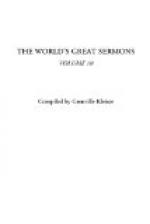DRUMMOND (1851—1897). The Greatest Thing in the World
Wagner (Born in 1851).
I Am a Voice
Gordon (Born in 1853).
Man in the Image of God
Dawson (Born in 1854).
Christ Among the Common Things of Life
Smith (Born in 1856).
Assurance in God
Gunsaulus (Born in 1856).
The Bible vs. Infidelity
Hillis (Born in 1858).
God the Unwearied Guide
Jefferson (Born in 1860).
The Reconciliation
Morgan (Born in 1863).
The Perfect Ideal of Life
Cadman (Born in 1864).
A New Day for Missions
Jowett (Born in 1864).
Apostolic Optimism
Index to Preachers and Sermons
Index to Texts
DRUMMOND
THE GREATEST THING IN THE WORLD
BIOGRAPHICAL NOTE
Henry Drummond, author and evangelist, was born at Stirling, Scotland, in 1851. His book, “Natural Law in the Spiritual World,” caused much discussion and is still widely read. His “Ascent of Man” is regarded by many as his greatest work. The address reprinted here has appeared in hundreds of editions, and has been an inspiration to thousands of peoples all over the world. There is an interesting biography of Drummond by Professor George Adam Smith, his close friend and colaborer. He died in 1897.
DRUMMOND
1851—1897
The greatest thing in the world[1]
[Footnote 1: Reprinted by permission of James Pott & Co.]
Tho I speak with the tongues of men and of angels, and have not love, &c.—I Cor. xiii.
Everyone has asked himself the great question of antiquity as of the modern world: What is the summum bonum—the supreme good? You have life before you. Once only you can live it. What is the noblest object of desire, the supreme gift to covet?
We have been accustomed to be told that the greatest thing in the religious world is faith. That great word has been the key-note for centuries of the popular religion; and we have easily learned to look upon it as the greatest thing in the world. Well, we are wrong. If we have been told that, we may miss the mark. I have taken you, in the chapter which I have just read, to Christianity at its source; and there we have seen, “The greatest of these is love.” It is not an oversight. Paul was speaking of faith just a moment before. He says, “If I have all faith, so that I can remove mountains, and have not love, I am nothing.” So far from forgetting, he deliberately contrasts them, “Now abideth faith, hope, love,” and without a moment’s hesitation the decision falls, “The greatest of these is love.”




